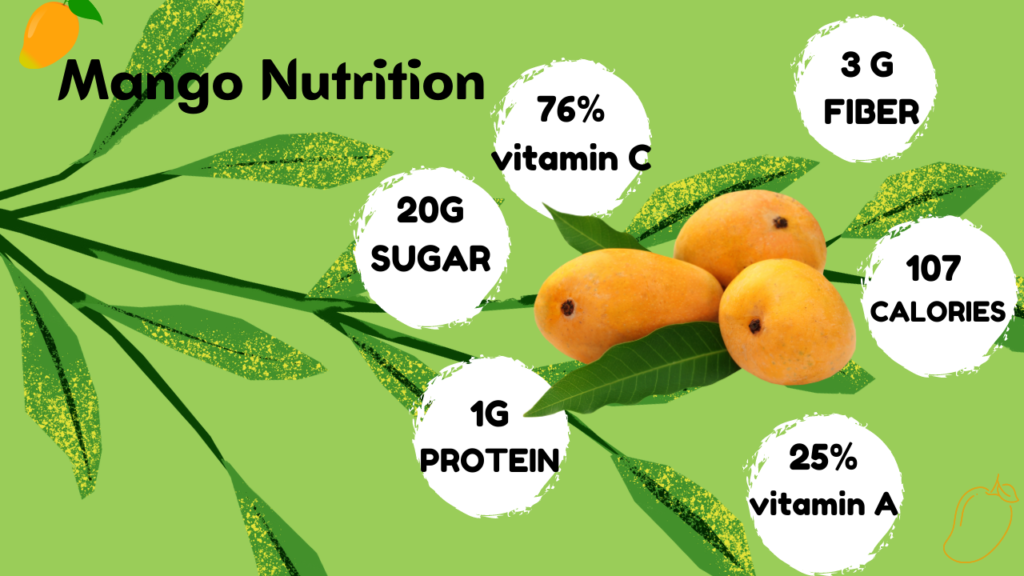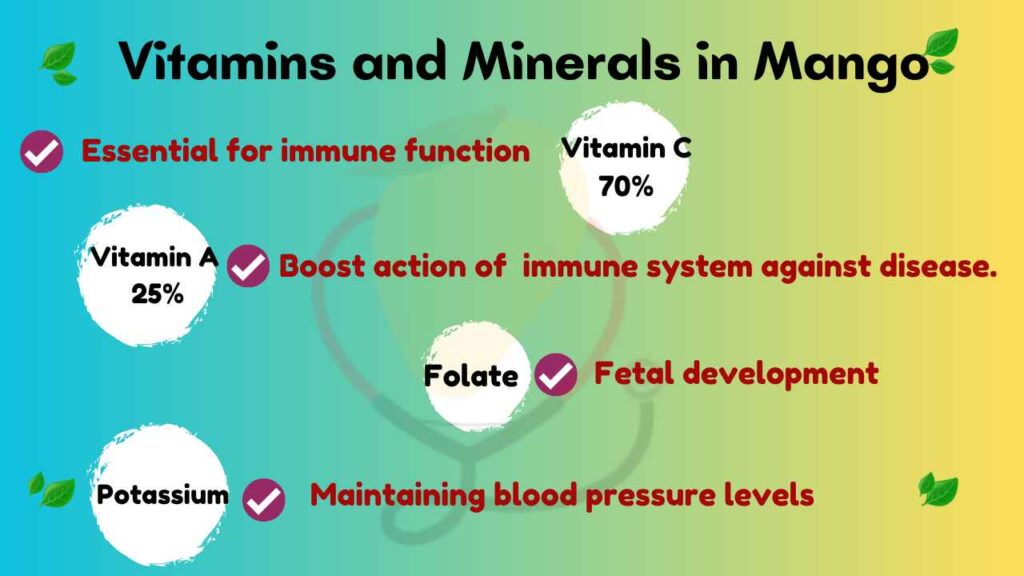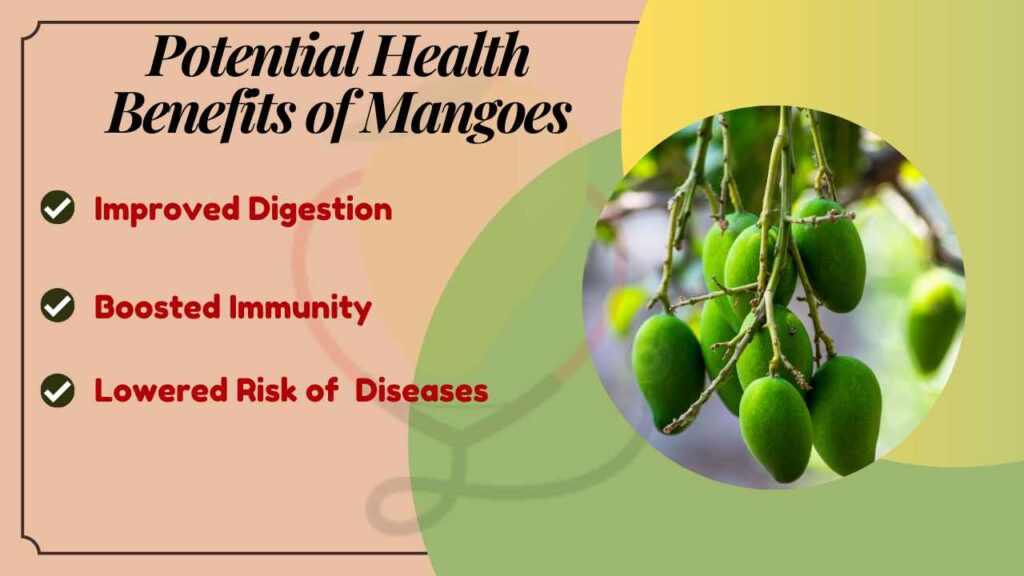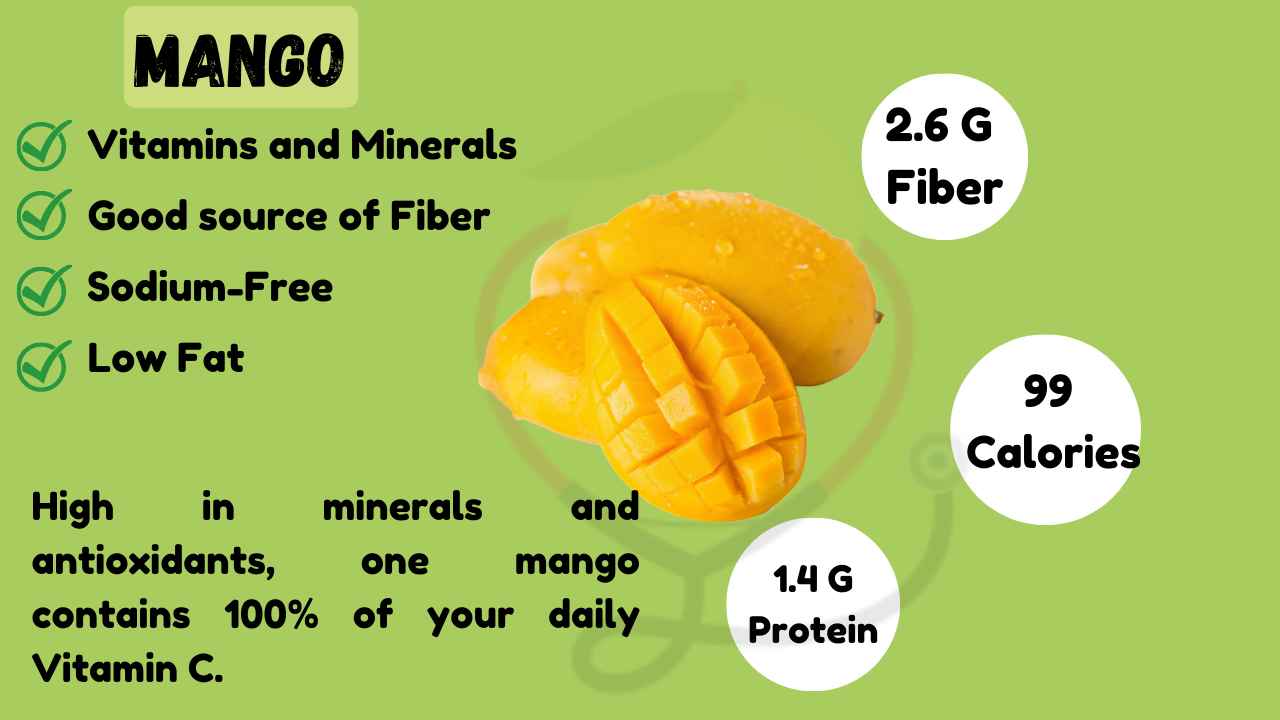Mangoes are not just delicious but also a great source of nutrition.
Mangoes are naturally sweet and contain a significant amount of sugar. Nonetheless, the sugar in fruits is not the same as processed sugar since it comes with fiber and a variety of nutrients that benefit the body. [1]
In this article, we will explore the nutritional value of mangoes, and their potential health benefits.
Mango Nutrition
Mangoes are a rich source of several essential nutrients, including vitamins, minerals, and fiber. Here’s a breakdown of the nutritional value of one mango. [2]

- 107 calories
- 3 grams of fiber
- 24 grams of sugar
- 1 gram of protein
- 25 percent daily value of vitamin A
- 76 percent daily value of vitamin C
- 257 mg of potassium
- 0.2 mg of vitamin B-6
Mango Nutrition Facts
One cup (165 grams) of diced mango provides the following nutrients: [3]
1: Calories
One cup of diced mango contains approximately 100 calories, making it a low-calorie snack option.
2: Carbohydrates
Mangoes are high in carbohydrates, with one cup of diced mango providing approximately 25 grams of carbohydrates.
However, most of the carbohydrates in mangoes come from natural sugars, making it a healthy sweet treat. [4]
3: Fiber
Mangoes are a good source of fiber, with one cup of diced mango providing approximately 3 grams of fiber. Fiber is essential for good digestive health and can help regulate blood sugar levels. [5]
4: Protein
Mangoes are not a significant source of protein, with one cup of diced mango providing approximately 1 gram of protein. [6]
5: Fat
Mangoes are low in fat, with one cup of diced mango providing less than 1 gram of fat.
Vitamins and Minerals in Mango
Mangoes are an excellent source of essential vitamins and minerals, including: [7]

1: Vitamin C
One cup of diced mango provides approximately 70% of the daily recommended intake of vitamin C, which is essential for immune function and collagen production. [8]
2: Vitamin A
Mangoes are high in beta-carotene, which is converted to vitamin A in the body. One cup of diced mango provides approximately 25% of the daily recommended intake of vitamin A. Vitamin A boost the action of the immune system against disease. [9]
3: Folate
Mangoes are a good source of folate, which is essential for fetal development and may help reduce the risk of certain types of cancer.
4: Potassium
Mangoes are a good source of potassium, which is essential for maintaining healthy blood pressure levels.
Potential Health Benefits of Mangoes
Mangoes have excellent nutritional value. Mangoes also offer several potential health benefits, including: [10]

1: Improved Digestion
Mangoes are a good source of dietary fiber, which help to promote good digestive health. Fiber can help regulate bowel movements, prevent constipation, and reduce the risk of colon cancer. [11]
2: Boosted Immunity
Mangoes are high in vitamin C, which is essential for immune function. Vitamin C helps the body produce white blood cells, which are responsible for fighting off infections and diseases. [12]
3: Lowered Risk of Chronic Diseases
Mangoes are high in antioxidants, which can help protect the body from damage caused by free radicals.
Free radicals are unstable molecules that can damage cells and contribute to the development of chronic diseases such as cancer, heart disease, and diabetes.
The antioxidants in mangoes, including quercetin, isoquercitrin, astragalin, fisetin, and gallic acid, have been shown to help protect against these diseases. [13]
Mangoes are a delicious and nutritious fruit that offer a wide range of health benefits.
They are high in fiber, vitamins, and minerals and may help improve digestion, boost immunity, and lower the risk of chronic diseases.
Incorporating mangoes into your diet is easy, and there are many delicious ways to enjoy this sweet fruit.
FAQs
Are mangoes safe for diabetics to eat?
While mangoes are high in natural sugars, they are also high in fiber and have a low glycemic index, which means they are safe for diabetics to eat in moderation.
Can mangoes help with weight loss?
Mangoes are low in calories and high in fiber, making them a good food choice for weight loss.
How many calories are in one serving of mango?
One serving of mango, which is approximately one cup of diced mango, contains approximately 100 calories.
What is the best way to select a ripe mango?
To select a ripe mango, look for one that is slightly soft to the touch and has a sweet fragrance.
How can I tell if a mango is ripe?
You can tell if a mango is ripe by gently pressing on the skin. A ripe mango will be slightly soft to the touch. You can also smell the mango – a ripe mango will have a sweet fragrance.

